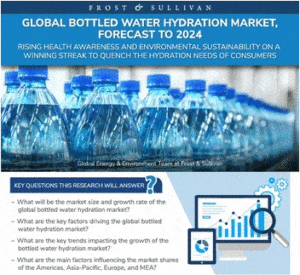Manufacturers to differentiate via innovative products and business models in addition to sustainable packaging, finds Frost & Sullivan
 SANTA CLARA, Calif. – December 11, 2018 – To stand out in a highly fragmented market, bottled water companies are changing the look and feel of their packaging to establish their brand and address consumer concerns regarding the impact of single-use plastics on the environment. Global leading bottled water suppliers themselves have stated that about 2.5 liters of water is used to produce 1 liter of finished bottled water highlighting the sustainability-related challenge of the industry. Additionally, the use of PET bottles and the resulting plastic waste has a devastating impact on the land and marine ecological systems. The alarming rises in litter, as well as the resource-inefficient production process, have prompted and driving product and business model innovation opportunities in bottled water companies.
SANTA CLARA, Calif. – December 11, 2018 – To stand out in a highly fragmented market, bottled water companies are changing the look and feel of their packaging to establish their brand and address consumer concerns regarding the impact of single-use plastics on the environment. Global leading bottled water suppliers themselves have stated that about 2.5 liters of water is used to produce 1 liter of finished bottled water highlighting the sustainability-related challenge of the industry. Additionally, the use of PET bottles and the resulting plastic waste has a devastating impact on the land and marine ecological systems. The alarming rises in litter, as well as the resource-inefficient production process, have prompted and driving product and business model innovation opportunities in bottled water companies.
Frost & Sullivan’s Global Bottled Water Hydration Market, Forecast to 2024 analyzes the growth opportunities and industry challenges in the bottled water segments of still, sparkling, flavored, and functionalwater. It presents the market drivers, restraints, and competitive structure of participants across the regions of North America, Latin America, Europe, Middle East and Africa, and Asia-Pacific.
For further information on this analysis, please visit: https://frost.ly/2z0
“Stringent government policies are prompting businesses to adopt and implement sustainable packaging practices to reduce the pollution caused by plastic waste,” said Anagha Lakshmi J Energy & Environment Research Analyst at Frost & Sullivan. “Companies like Evian and Highland Spring will be launching eco bottles that are 100 percent PET recyclable, others such as Nestle are aiming to achieve 100 percent recycling or reuse of their packaging by 2025 while Britain will be introducing a deposit-return scheme for single-use drink containers. Initiatives like these are greatly increasing awareness among consumers.”
From a regional view, the North American and European regions are expected to remain more or less stable contributing $24.93 billion and $48.04 billion respectively. Asia-Pacific was the largest market in terms of total consumption, accounting for 33 percent of the market in 2017 due to its changing lifestyles, large population, and rapid urbanization. Similarly, Latin America, and the Middle East and Africa are likely to experience rapid growth due to their poor water infrastructure and unsafe tap water.
“In response to the rising health consciousness and unique regional palettes of consumers, bottled water manufacturers are turning away from aerated water and soft drinks, towards customizing products tailored to local palettes as well as enhanced with new flavors and various proteins, nutritional, and detox supplements,” noted Lakshmi.
Meanwhile, the widening of the global addressable market has encouraged participants to implement innovative business models in their market expansion strategies. Some of the most prominent growth opportunities and trends in the market include:
- Focus on eco-friendly packaging: Biodegradable containers that are easy to carry and convenient to dispose will find higher uptake.
- Implementation of novel business models: The franchisee model is popular among entrepreneurs with low investment budgets, as it gives them access to a full suite of equipment, training, and tools. Another viable model is the installation of water purification systems with smart meters at grocery stores and public places, where people can refill their bottles and pay as they go.
- Partnerships with water utility companies will enable bottled water firms to provide locally and sustainably produced bottled drinking water to a local regional customer.
- Collaborations with or acquisitions of small players to establish footprint as well as enhancing the strengths and expertise of the smaller companies especially in developing countries with key challenges associated with drinking water hydration.
Global Bottled Water Hydration Market, Forecast to 2024 is part of Frost & Sullivan’s global Environment & Water Growth Partnership Service program.
About Frost & Sullivan
For over five decades, Frost & Sullivan has become world-renowned for its role in helping investors, corporate leaders and governments navigate economic changes and identify disruptive technologies, Mega Trends, new business models and companies to action, resulting in a continuous flow of growth opportunities to drive future success. Contact us: Start the discussion.
Global Bottled Water Hydration Market, Forecast to 2024
ME08-15
Contact:
Jaylon Brinkley
T: +1 210 247 2481
E: jaylon.brinkley@frost.com
http://www.frost.com



